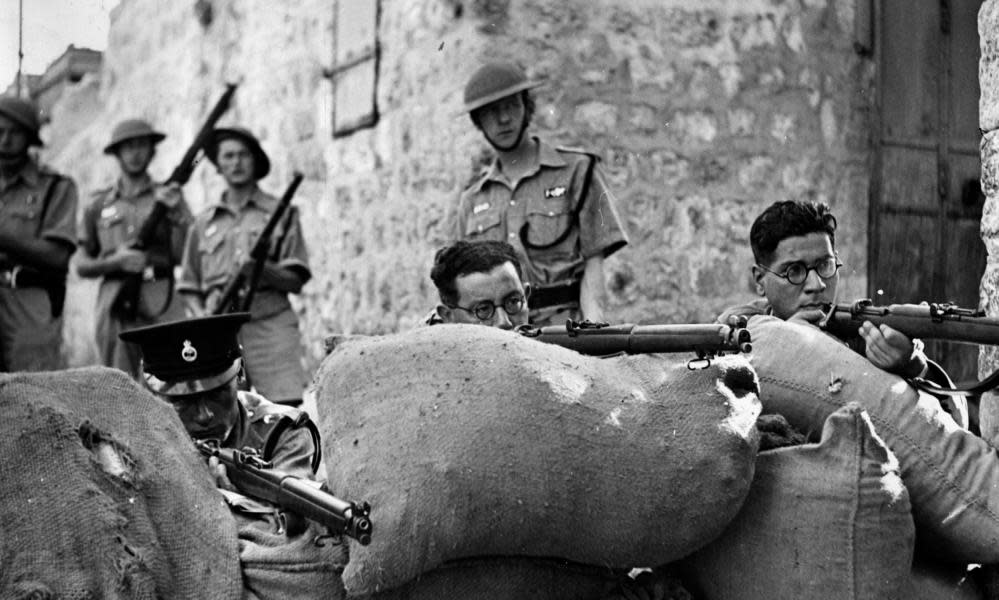The Balfour declaration and a century of conflict in the Middle East | Letters

Ian Black (Britain’s calamitous promise, 17 October) omits a critical aspect of the history of the Balfour declaration and British policy towards Jewish immigration and settlement which had significant impact on Jews, Palestinians and on Jordanians as well. In 1922 and the years following, Winston Churchill’s government forbade Jews from residency in what was then known as Trans-Jordan, now as Jordan. This cut off all land east of the Jordan river from Jewish settlement. Four-fifths of Mandatory Palestine was thus dedicated to the creation of an Arab state.
While Palestine and later Israel would both have large Jewish and Arab populations, Trans-Jordan, and later Jordan, became almost exclusively Arab with a majority Palestinian population, minority Bedouin population, and no Jewish population at all. The history of Trans-Jordan and later Jordan is integral to understanding the history of the British mandate in Palestine and the complex fate of Jews, Palestinians and Arabs as a whole and their relationships and interactions. It cannot be excluded from analysis of the Balfour declaration, its context, and consequences.
Noam Schimmel
Visiting fellow, Kellogg College, Oxford
• November brings not only the centenary of the Balfour declaration but also, on the 29th, the 70th anniversary of the UN resolution to partition Palestine, which legitimised the establishment of the state of Israel in 1948. In his excellent survey of the Balfour declaration and its consequences, Ian Black rightly recalled that both the US and the USSR voted for partition – but he could have mentioned explicitly that Britain abstained. Ernest Bevin, the foreign secretary, saw the proposed partition as unjust to the Palestinians and the British refused to enforce it.
As Black indicates, in the later years of the mandate the British did try, however ineffectually but at considerable cost, to mitigate the consequences of the Balfour declaration – notably in the white paper of 1939, which evoked anti-British terrorism by the Zionist extremists. Mrs May will probably not want to refer to this period at her festive dinner.
Dr Michael Laird
Havant, Hampshire
• Anyone reading Ian Black’s long read might be forgiven, whatever their views about the Netanyahu government’s policies, for questioning why there is no mention of the fact that Israel is effectively the only functioning democracy with a free press, an independent judiciary and religious freedom in the region, let alone that the UN resolution which created the state also provided for a state of Palestine and was met with an attack on Israel by its neighbours. Israel certainly needs to do much more to promote the two-state solution, but there is scant evidence that others in the region are committed to that outcome.
Jeremy Beecham
Labour, House of Lords
• The close relationship between CP Scott, then editor of the Manchester Guardian, and Chaim Weizmann, later to become Israel’s first president, is outlined in Daphna Baram’s book Disenchantment: The Guardian and Israel, published in 2004. Weizmann’s knowledge of chemistry helped the British government’s war effort through the production of cordite. As the book shows, the chain of events set in motion a century ago, with its tragic consequences for the Palestinian Arab inhabitants of the land, has seen a shift in the Guardian’s reporting, reflecting a much greater understanding among the wider public in this country of the catastrophic and ongoing impact on Palestinians.
It is deeply shaming that our prime minister’s hospitality for Benjamin Netanyahu puts her at odds with so many people in this country – including many Jewish people. The celebratory dinner on 2 November does not reflect the deep concern about a dramatically deteriorating political, humanitarian and illegal situation, which our government has helped to maintain over so many years. We do not believe that this support for the state of Israel and its current extreme rightwing government is either wise or moral. Only a just solution for both peoples will lead to peace.
Margaret and Robin Derbyshire
Billericay, Essex
• Mark Regev, the Israeli ambassador to the UK, writes (Letters, 14 October) that the Palestinians “chose intransigence over independence” in 2014. When the 2014 talks ended, the Israeli newspaper Yedioth Ahronoth interviewed US negotiators to produce “the closest thing to an official American version of what happened”. The Palestinians certainly wanted their state, and made huge concessions to try to get one, including accepting a “border outline so 80% of settlers would continue living in Israeli territory”. Israel would not accept even that and refused to draw its own border line on the map. The talks finally collapsed with the announcement of 700 more settlement houses, and “the Americans understood from their Israeli counterparts that [this] was an intentional act of sabotage”. So it was Israel that was intransigent, and the Palestinians who have no “partner for peace”.
Rob Wall
Bedford
• Join the debate – email guardian.letters@theguardian.com
• Read more Guardian letters – click here to visit gu.com/letters

 Yahoo News
Yahoo News 
